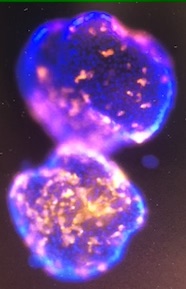
Organoid model of gastric cancer.
Epigenetics can influence how a gene is expressed
Epigenetic changes are modifications to the DNA and chromosomes that do not change the sequence of a gene but can change the amounts of that gene expressed in a cell. Frequently, epigenetic changes can inactivate genes, increasing the likelihood of cancers developing or progressing.
Implications for diffuse gastric cancer
Hereditary diffuse gastric cancer (HDGC) is caused by an inherited mutation of one copy of the E-cadherin gene (CDH1). Small gastric cancers develop in people with the mutation when the 2nd copy of CDH1 is silenced by epigenetic mechanisms. These early cancers can occur in large numbers (up to several hundred per stomach) but are relatively inactive. Over time, one of these inactive tumours will acquire additional genetic damage and progress to advanced disease.
Epigenetic alterations can be reversed which suggests that interventions in early stage (pre-malignant) cancers may be more successful than the treatment of late stage tumours. Late stage tumours have multiple mutations, and abnormal cell regulation making them a more complicated, and far more difficult to treat.
Preventing advanced cancer by reactivating the silenced gene
Our hypothesis is that by using drugs to reactivate the epigenetically silenced copy of CDH1 we can prevent advanced cancer in patients with HDGC. In this project, we are characterising the epigenetic effects of a number of histone decetylase inhibitors (HDACi) to determine their potential as a chemopreventative agent for HDGC, and other high risk types of cancer.